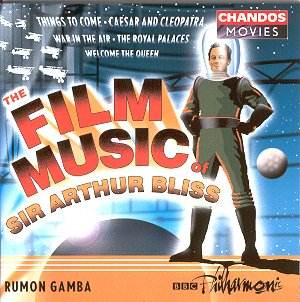Sir Arthur BLISS
The Film Music of Sir Arthur Bliss
1. Welcome the Queen.
2. Things to Come Concert Suite arranged and reconstructed by Philip
Lane.
3. The Royal Palaces Suite.
4. Caesar and Cleopatra Suite from the incidental film music edited
and arranged by Giles Easterbrook and Malcolm Binney.
5. War in the Air Theme.
 Rumon Gamba conducting the
BBC Philharmonic
Rumon Gamba conducting the
BBC Philharmonic
 Chandos CHAN 9896
[73:11]
Chandos CHAN 9896
[73:11]
Crotchet
AmazonUK
AmazonUS

Bliss's music for Things to Come had a chequered history. Wells, a self-confessed
music ignoramus, had quite clear ideas about the role of music in the film
planned by Korda. It was at Wells' insistence that Bliss agreed to write
the music for the film. He produced a substantial score and in March 1935
recorded about thirty minutes of it with the London Symphony Orchestra. He
sent copies of the records to Sir Henry Wood who was enthusiastic about the
music and arranged for the composer to conduct a seven movement suite (including
Idyll which had been dropped from the film) in September 1935. In
the meantime work on the film went on and Korda, facing budget limitations,
deadlines and the like, called in Lionel Salter to arrange the score and
Muir Mathieson to re-record it. While the film got a mixed reception, the
music was well received. (Some of it had been made available on discs which
apparently sold like "hot cakes".)
Bliss prepared a concert suite in six movements, dropping the Idyll
movement, reordering the movements and incorporating a truncated version
of the Epilogue now retitled Reconstruction. Later, the late
Christopher Palmer reconstructed some other movements and prepared a longer
selection of the music incorporating some movements from the published concert
suite. Later still, eight sides of test pressings were found in Sir Henry
Wood's archives including the original Prologue and Epilogue.
The appearance of some pages of the autograph score, confirmed some of the
existing material as well as some of the discrepancies between the actual
score and the soundtrack. Philip Lane was then able to complete his new
arrangement as recorded here, which is the most complete selection so far.
The only missing item is the aforementioned Idyll (Giles Easterbrook
believes that the entry of the Black Queen in Checkmate is
based on it). So now, we have the original Prologue, not that different
from Palmer's reconstruction, and the original Epilogue, much longer
than Palmer's; as well as movements missing from both the concert suite and
the Palmer selection. These previously missing movements are Pestilence
(not in Palmer) and Excavation (absent from both, and a quite
impressive movement with prominent percussion ostinati). The only other music
not included here are some carol arrangements. Otherwise this sequence is
by far the most comprehensive selection of what is one of the finest film
scores of the 20th Century.
The march Welcome the Queen, written in 1954 for a documentary on
the return of Elisabeth II from her 1954 Commonwealth tour, is fairly well-known,
and is an example of the rousing marches that Bliss and Walton could write.
The Royal Palaces Suite (1966) was composed for a BBC/ITV television
documentary. Somewhat lighter stuff though some of it (e.g. the first section
and the Royal Palace theme), is vintage Bliss. So is the hitherto unknown
music that Bliss wrote for Gabriel Pascal's Caesar and Cleopatra after
Shaw's play. Pascal initially wanted Prokofiev to write the music. Then he
approached Walton, who had already written the score for Major Barbara,
but who turned the job down. Shaw on the other hand wanted Bliss who agreed
to write the music. In the meantime things went wrong. Bliss walked out and
Britten was asked to step in. He too walked out and George Auric eventually
wrote the music (on CHANDOS CHAN 9774). Giles Easterbrook and Malcolm Binney
arranged a substantial suite in eight movements, some of which are Bliss
at his best (The Sea, the Barcarolle and the Supply Sequence
are particularly fine). A most welcome addition.
This generous CHANDOS release ends with the theme War in the Air written
in 1954. The music for this ambitious project was commissioned from Alwyn,
Arnold and Clifton Parker. Again a typical Bliss martial tune.
This superb release is highly commended. Rumon Gamba has much sympathy for
the music and conducts colourful, vital readings. The BBC Philharmonic play
with verve, assurance and enjoyment. A magnificent addition to the expanding
CHANDOS Movies Series, the more so that we now have an almost complete
Things to Come and some unfamiliar music well worth rescuing.
Hubert Culot
Prologue |
P.L. |
C.P. |
|
Ballet for Children |
P.L. |
C.P. |
A.B.(1) |
March |
P.L. |
C.P.(4) |
A.B.(6) |
Attack |
P.L. |
C.P.(3) |
A.B.(2) |
The World in Ruins |
P.L. |
C.P. |
|
Pestilence |
P.L. |
|
A.B.(3) |
Excavation |
P.L. |
|
|
The Building of the New World |
P.L. |
C.P. |
|
Machines |
P.L. |
|
A.B.(5) |
Attack on the Moon Gun |
P.L. |
C.P. |
|
Epilogue |
P.L. |
C.P. |
A.B.(4) 2 |
NOTES
L.P.: Arrangement by Philip Lane
C.P.: Arrangement by Christopher Palmer
A.B.: Concert suite as recorded by Bliss (the bracketed numbers refer to
the rank of the movement in the suite)
"Epilogue":
Philip Lane has the complete version lasting over 7 minutes whereas Christopher
Palmer, who reconstructed it from the soundtrack, has a shorter version (slightly
over 2 minutes) whereas the version in the Concert Suite is titled
"Reconstruction".
See also major article/review by
Stephen Lloyd
See also review by Gary Dalkin

